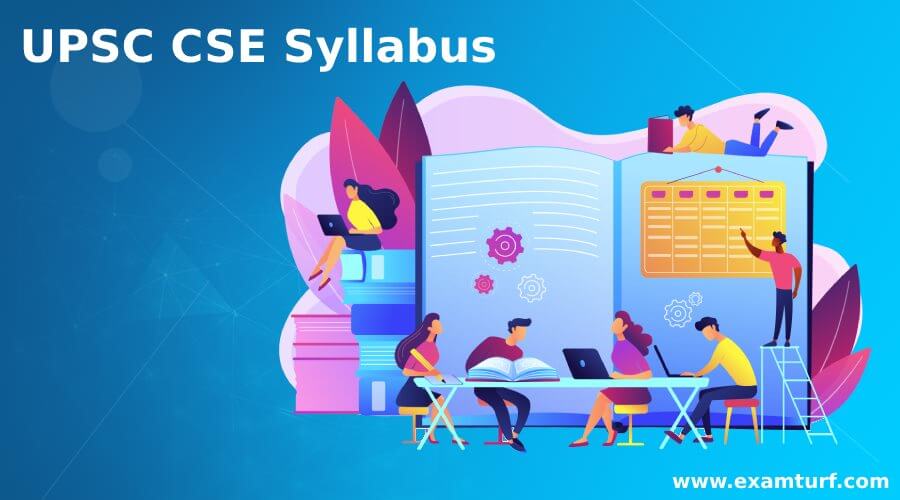
Introduction To UPSC CSE
The following article provides an outline for UPSC CSE Syllabus. UPSC (Union Public Service Commission) is a central government recruiting agency. This agency conducts the exam and recruits the best eligible candidates for all Indian services and group A and group B of central services. It is one of the toughest exams in India and thus has the highest reputation and value for the people who crack the exam. UPSC conducts various types of exams every year and out of which CSE (Civil Service Examination) is one among them. The recruitment in CSE is done for various services like IAS, IPS, IFS, IRS, etc. UPSC conducts the exam in 3 rounds, i.e., prelims, mains, and final interviews.
The syllabus for the exam is very vast and needs extensive dedication, discipline, and determination to succeed. The prelims exam is common for all service exams, which consists of aptitude and general studies. Mains exam is specific to the CSE syllabus and upon passing, it will make way for the final interview. The marks from Mains and the Final interview will decide your selection for CSE. This article gives an overview of the CSE syllabus, what is the time plan and what are all the tricks to crack it.
Guidance To UPSC CSE Syllabus
Given below is the guidance to UPSC CSE Syllabus:
1. Preparing Yourself
There are 2 parameters that need to be considered before preparing for the exam.
a. Are you eligible?
The eligibility is verified from 4 conditions:
- Age
- Attempts
- Nationality
- Educational Qualifications
There are many conditions, procedures and special cases for eligibility criteria and the official website will give the complete details. For the year 2021 UPSC CSE exam, the notification will be uploaded on the official website on 10-02-2021.
For reference, follow the previous year’s notification [1].
The overview of eligibility criteria is shown in the following table:
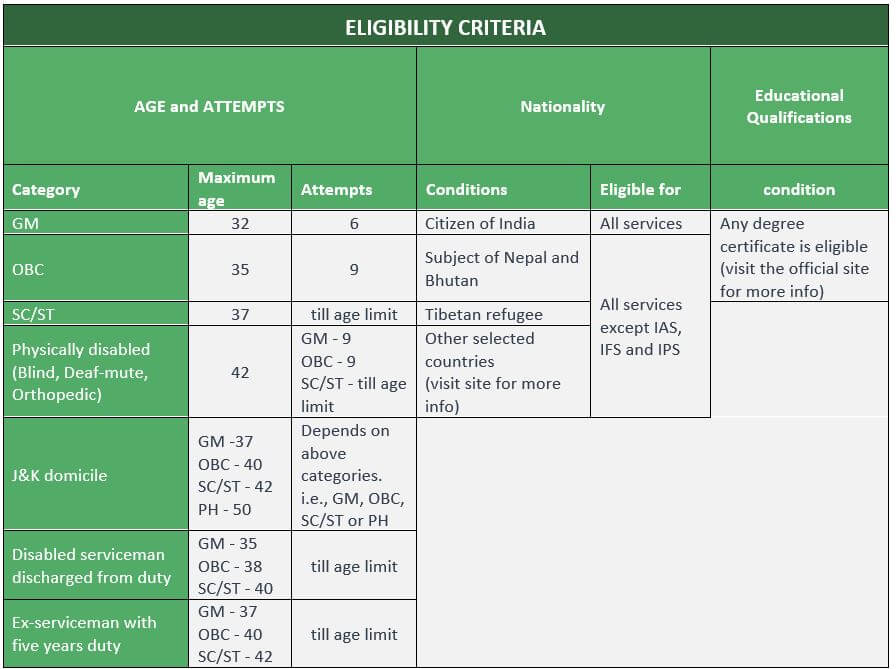
b. Are you ready for the competition?
The competition for these exams is very high and cracking them on the first attempt is very low.
The main reasons are:
- Hard and vast syllabus
- Tight cutoffs every year
- Posts to candidate ratio are very low (Lakhs of candidates appear for few posts)
- Long duration of examination (Approximately 32 hours for the whole process)
The following table provides cutoff of UPSC CSE from the past 6 years.
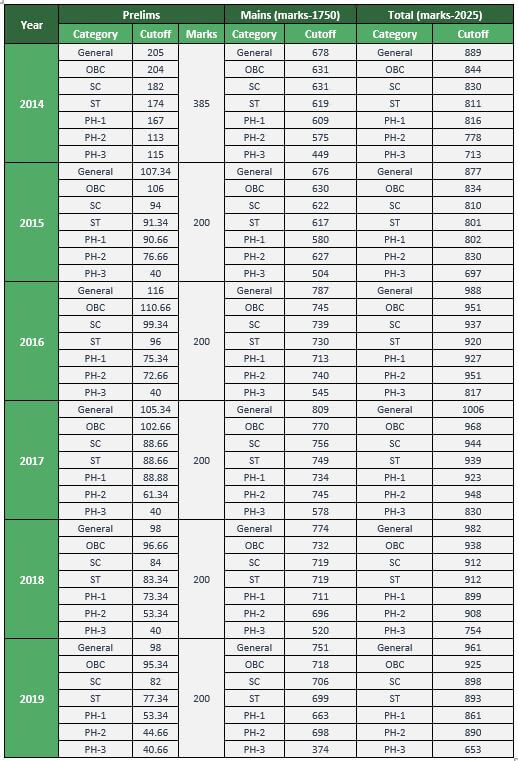
2. Exam Pattern and Syllabus of UPSC CSE
UPSC CSE exam is divided into 2 parts:
- Prelims: Consist of MCQs and the score will not be counted for final ranking.
- Mains: Consists of written question paper and final interview.
a. Preliminary Exam Syllabus [1]
It consists of 2 papers of 200 marks and 2 hours each. Paper 2 of the Preliminary exam will be a qualifying paper with minimum qualifying marks of 33%. Candidates need to attend both the papers, failing to attend even one leads to disqualification.
Paper 1:
- Current Affairs: National and International events
- Indian history and freedom movement
- Indian and World: Physical, Social, Economic and Geographic conditions
- Indian constitution and Indian politics
- Economic and Social Development
- Environmental ecology, Bio-diversity, and Climate Change
- General Science
Paper 2:
- Comprehension
- Interpersonal and communication skills
- Logical reasoning and analytical ability
- Decision making and problem-solving
- General mental ability
- Basic numeracy and data interpretation
b. Mains exam syllabus [1]
The Mains exam is intended to evaluate the candidate’s depth of understanding of rather than merely gauging through memory. There will be 9 papers to write in the Mains exam, in which 2 are qualifying, 1 essay, 4 are general and 2 are optional subject papers.
The following table gives an overview of Mains Syllabus:
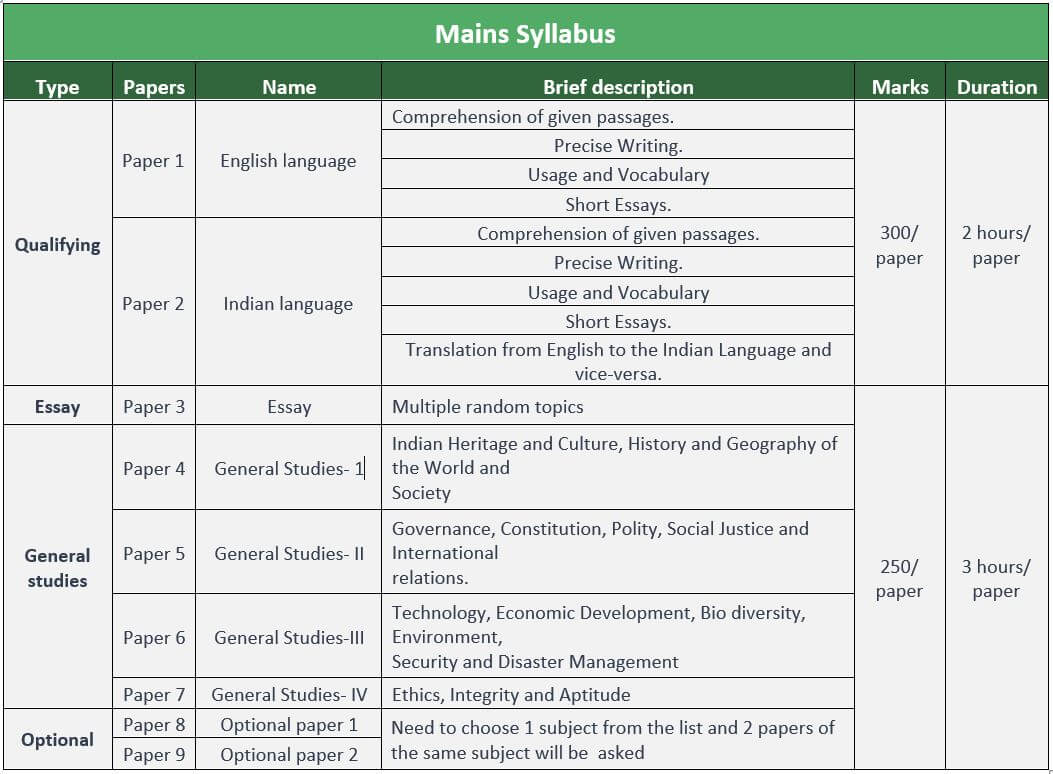
After qualifying for the Mains exam, candidates are called for an interview round (personality test). The total marks of mains will be 1750. Candidates should secure at least 25% marks in both the language papers as a minimum qualifying criterion for the consideration of papers on Essay, General Studies, and Optional Subject, if in case the candidate fails to qualify, then the marks obtained will not be considered. The scores of Essay, General Studies, Optional subjects, and Interview will be added to get the final marks which are 2025. Based on the number of positions, candidates will be hired and the last person hired will decide the cutoff for the next year.
3. Planning for Exam
The exam process of UPSC CSE is lengthy and thus needs proper discipline for completing the syllabus and exam.
Following are the tips which will help in focusing the UPSC in a better way:
- Follow the 10-hour rule: Good practice is to spend 1 hour for newspaper and current affairs, 6 hours for Mains syllabus, and 3 Hours for prelims syllabus with frequent breaks.
- Study hard things at the silent hour: The silent hours refer to midnight period (11 PM-2 AM) or early morning period (5 AM-7 AM). Based on the convenience, choose to study at silent hours. During that time, disturbances will be less and that silent environment makes the mind to grasp quickly.
- Creating a check list: Having a record as to what needs to be done every day with time slots and giving honest feedback will improve the study discipline.
Below is shown a draft to follow the timetable:
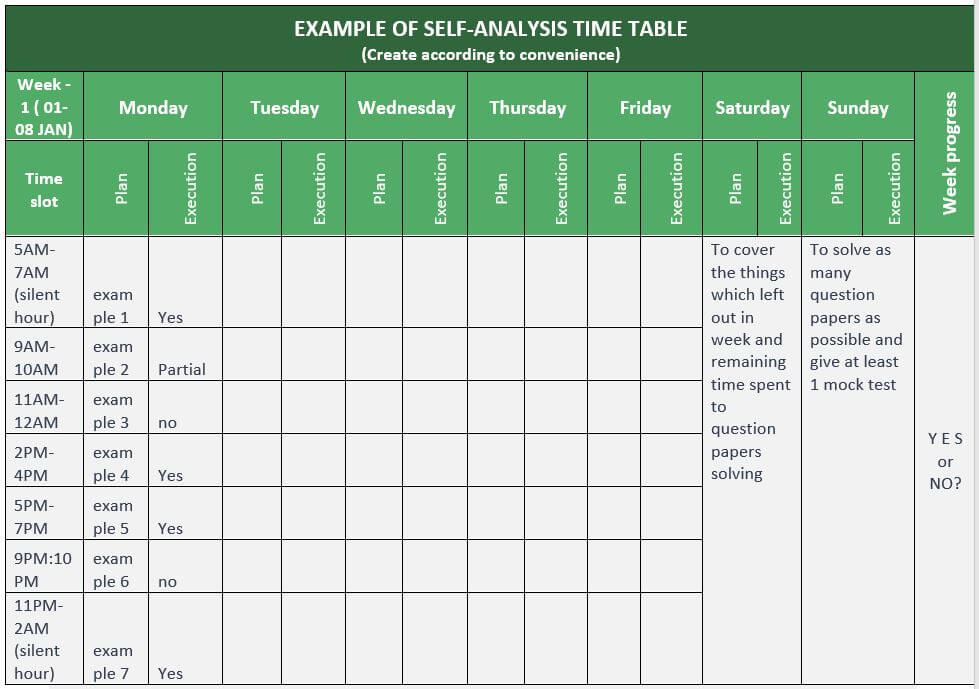
- Solving previous years questions: This will help to understand the pattern of questions and managing the time for writing the answers. Pattern repetition and the importance of certain topics can be easily identified.
- Solving mock exam: Creating an exam environment is essential to understand one’s anxiety levels, time management, and method of answering the questions. Self-evaluating with honest opinions will help to develop better.
4. Risk Analysis
Due to limitations of age and attempts, one should need to analyze properly before moving forward in preparing and writing the exam.
Following are risk plan for the broad 3 types of candidates:
- Students (Below 22 years): They do have the best position in preparing UPSC. Fewer responsibilities, an energetic mindset, and a young brain will help to focus on UPSC, but the only disadvantage is to pass graduation and thus need to focus on both academics and UPSC. The candidates who choose the Arts stream as graduation would be considered as the best candidate for UPSC CSE as the syllabus for graduation will coincide with UPSC.
- Working professionals (Above 22 years): This set of candidates needs to find ways to study. Weekends need to be utilized very well to get a good grip on syllabus completion. They have the advantage of employment and thus can prepare without much pressure, but lack of intent may divert from UPSC.
- Non-working (Above 22 years): These are the people who are found in maximum numbers in preparing for the exam. They will be at high risk and high pressure and they need to plan extensively to get past through UPSC. It would always be good if the candidates from this category look for employment opportunities after they pass 25 years.
UPSC is laborious and needs time and patience in completing. People cracking it in 1-2 attempts are considered extraordinary and thus everyone needs to understand that it’s not possible in 2 years. People with strong determination need to step up at this and always need to have an alternate plan to make life secured.
Recommended Articles
This is a guide to UPSC CSE Syllabus. Here we discuss the introduction and guidance to UPSC CSE syllabus for better understanding. You can also go through our other suggested articles to learn more –
Are you preparing for the entrance exam ?
Join our Exam Preparations test series to get more practice in your preparation
View More